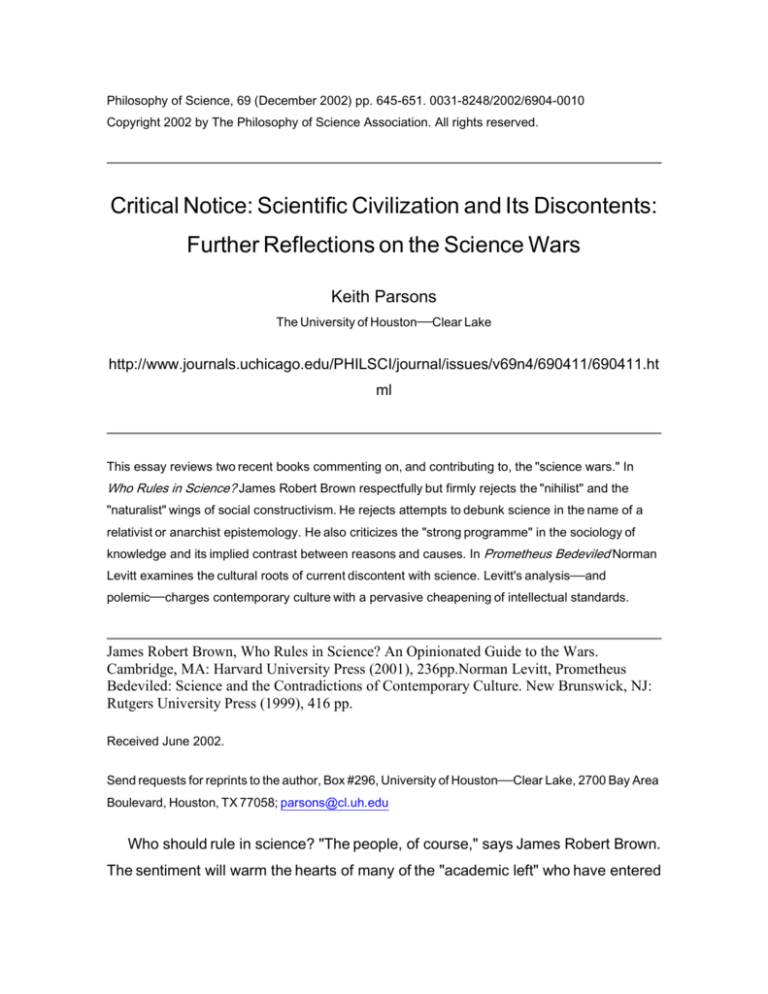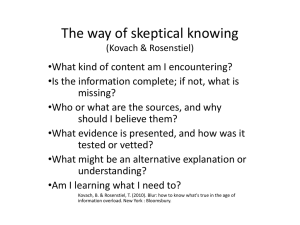
Philosophy of Science, 69 (December 2002) pp. 645-651. 0031-8248/2002/6904-0010
Copyright 2002 by The Philosophy of Science Association. All rights reserved.
Critical Notice: Scientific Civilization and Its Discontents:
Further Reflections on the Science Wars
Keith Parsons
The University of Houston
Clear Lake
http://www.journals.uchicago.edu/PHILSCI/journal/issues/v69n4/690411/690411.ht
ml
This essay reviews two recent books commenting on, and contributing to, the "science wars." In
Who Rules in Science? James Robert Brown respectfully but firmly rejects the "nihilist" and the
"naturalist" wings of social constructivism. He rejects attempts to debunk science in the name of a
relativist or anarchist epistemology. He also criticizes the "strong programme" in the sociology of
knowledge and its implied contrast between reasons and causes. In Prometheus Bedeviled Norman
Levitt examines the cultural roots of current discontent with science. Levitt's analysis
polemic
and
charges contemporary culture with a pervasive cheapening of intellectual standards.
James Robert Brown, Who Rules in Science? An Opinionated Guide to the Wars.
Cambridge, MA: Harvard University Press (2001), 236pp.Norman Levitt, Prometheus
Bedeviled: Science and the Contradictions of Contemporary Culture. New Brunswick, NJ:
Rutgers University Press (1999), 416 pp.
Received June 2002.
Send requests for reprints to the author, Box #296, University of Houston
Clear Lake, 2700 Bay Area
Boulevard, Houston, TX 77058; parsons@cl.uh.edu
Who should rule in science? "The people, of course," says James Robert Brown.
The sentiment will warm the hearts of many of the "academic left" who have entered
the "science wars" with the stated aim of democratizing science. How to give
scientific power to the people? By taking it away from scientific elites, seems to be
the answer of the recent postmodernist and social constructivist science critics. As
these critics see it, science enjoys an illicit image of superior objectivity and
rationality an image which scientific elites have carefully contrived in order to
rationalize various forms of hegemony. Though their jargon is often opaque, the aim
of the science critics is clear. They seek to democratize by debunking. By
derogating scientific claims and methods they aim to show that science deserves
no privileged epistemological status. This deflationary project has taken a number
of forms. For instance, Bruno Latour and Steve Woolgar have argued that "nature"
and "reality" are nothing but what scientists agree to regard as natural and real
(Latour and Woolgar 1986, 236 237). Thus, contrary to the traditional image of
science, science does not discover truths about an antecedently-given reality; it
constructs its "facts."
Brown also wants science to serve democracy, but he has no sympathy for the
would-be debunkers. His is the view of a hopelessly out-of-date Old Leftist. He
holds that the people are served best when good science is used to attack socially
pernicious bad science. For Brown, Stephen Jay Gould's critique of Herrnstein and
Murray's notorious The Bell Curve is a prime instance of such public service.
Science therefore is a representative, not a direct, democracy. The people rule in
science when their interests are represented by socially responsible scientists like
Gould.
Surely Brown is right that good science has been the most potent corrective to
the noxious pseudoscientific props of oppression and bigotry. It is not surprising
that T. H. Huxley was "the gun in the liberal armoury" (Desmond 1997, 385). Those
who affirm left/liberal values while disparaging the objectivity and rationality of
science are therefore engaging in unilateral intellectual disarmament. Still, those on
the left might have to bite the bullet occasionally when good science goes against
them. Daniel Dennett (1995) issued a salutary warning about Darwinism: It is
universal acid. If we take Darwinism to its logical conclusion, we might find that it
undermines ideologies of the left as well as the right feminism as well as
fundamentalism. The extremely intemperate reactions of some on the left to even
the mildest and most carefully qualified forms of sociobiology or evolutionary
psychology warn us that partisan rejection of science is not only a problem of the
right.1 Brown acknowledges this and offers the example of William Jennings Bryan,
a social progressive who incurred ignominy when he repudiated science in favor of
majoritarian populism.
Brown's first chapter focuses on the famous Sokal hoax of 1996.2 Sokal, an oldfashioned leftist like Brown, said that his aim was to save the left from antiscientific
irrationality. He thought that he had revealed the scientific ignorance and general
intellectual insouciance of the science critics. Brown thinks that Sokal failed to show
this, but he does see the episode as raising a standard around which defenders of
science might rally (24).
Rallying to the cause, Brown criticizes both what he calls the "nihilist wing" and
the "naturalist wing" of social constructivism. The former are those who completely
repudiate scientific ideals of objectivity and rationality and who defend some form of
epistemological anarchism or relativism. The latter are those, like David Bloor, who
accept the naturalistic methods of science and apply those methods to the study of
science itself (Bloor's Principle of Symmetry). Bloor concludes that even the most
successful science must be explained in terms of social causes rather than rational
reasons (Bloor, 1991). Brown's criticisms of both wings of social constructivism are
clear, cogent, and concise. Actually, they are a bit too concise.3 The reader should
consult two of Brown's earlier works, The Rational and the Social (1989) and
Smoke and Mirrors (1994) for more thorough analysis and critique.
For the sake of fairness, Brown also criticizes some of Sokal's supporters. For
instance, he chides Steven Weinberg (19) for saying that we should expect that
intelligent extraterrestrials would discover the same laws of nature that we have
(Weinberg 2000, 155). Brown replies that extraterrestrials would have formulated
the same laws only if they had undergone the same historical development (19).
How likely is it, Brown asks, that they would ever have developed phlogiston theory
(20)? But I do not think Weinberg is making the preposterous claim that the history
of alien science would have unfolded in the same way as ours. Rather, he is saying
that if we do think that we have discovered some true laws of nature (and Weinberg
thinks we have), we should expect that scientifically advanced aliens, through the
course of a very different history, would have eventually settled on those same
ones. Thus, we would expect that their understanding of magnetism and electricity
would entail something translatable into Maxwell's equations (Weinberg 2000, 168
169). This seems to me an eminently reasonable expectation.
Though his critique of constructivism covers some rather well-trodden ground,
Brown's treatment is fresh and insightful. He sheds light on the issues by clarifying
key terms and by reminding us of how the development of philosophy of science in
the twentieth century led to our present predicament. His admirable commitment to
fairness and evenhandedness, even when dealing with extreme positions, should
gain a hearing for his arguments even in the opposing camp. Preaching to the choir
has been all too common in the science wars. Nevertheless, there seems to me to
be a curious blind spot in his defense of scientific rationality. Though he rightly
dismisses the effusions of postmodernist feminists such as Luce Irigaray and
Katherine Hayles (196), he defends Sandra Harding (195 196). He thinks that
Harding has been unfairly criticized for her infamous remark about Newton's
Principia as a "rape manual," and that her overall claims about the role of metaphor
in science are sound (195 196, but see Klein 1996, 46 for a counterpoint). In
general, he regards feminist philosophers of science as science-friendly and as
striving to improve science by removing sexist bias. Perhaps this holds in many
cases, but in their critiques of Harding, Cassandra Pinnick and Ellen Klein make a
strong case for thinking that with friends like Harding science needs no enemies
(Harding 1991; Pinnick 1994; Klein 1996).
Whereas Brown seeks the high ground and his outlook is ultimately hopeful,
Norman Levitt is an unabashed science warrior and his view is pessimistic. Levitt
sees our culture as deeply conflicted about science and with no clear prospects for
resolving these clashes. Most obviously, we live in a society that both craves and
fears the technological products of science. Deeper and more troubling than this
ambivalence, however, is a profound and perhaps irremediable ignorance of
science. Worse still in Levitt's view is a pervasive intellectual laziness, underwritten
by trendy academic ideology, that repudiates the standards of rigor and precision
underlying all critical inquiry, most especially natural science. Things were not
always this way, says Levitt. At one time, before the leveling mania of
postmodernity, there was a widespread highmindedness
a conviction that even
ordinary people could and should achieve some degree of intellectual refinement.
Popular orators and writers of the nineteenth century did not shy from an elevated
style and diction that our sound-bitten, dumbed-down culture will not tolerate.
Now Levitt realizes that many will dismiss his sweeping indictment as a
jeremiad. A jeremiad it may be, but it is hard to dismiss. Reports from the trenches,
like Peter Sacks' hilarious and horrifying Generation X Goes to College (1996),
confirm that suspicions of intellectual decay are more than curmudgeonly
grousing.4 Sacks recounts his efforts to instruct the invincibly apathetic products of
an educational system that inculcates relativism and practices a pedagogy of
spoon-feeding. Within academe itself, it is hard to imagine that some of the worst
inanities, like Irigaray and Hayles, would have been tolerated had not elements of
academic society come to value declamation over logic and ideological rectitude
over scholarship (see Patai and Koertge, 1994).
For Levitt the signs of disaffection from science are everywhere. For instance,
highly organized and aggressive systems of pseudoscience, like UFOlogy and
creationism, continue to flourish though their doctrines defy some of the bestsupported claims of science. Equally paradoxical is the flourishing of natural
science in a culture that is intensely math-phobic.5 Levitt holds that the roots of our
cultural alienation from science run deep. Perhaps the deepest root is human
craving for teleology in a universe that science treats as aimless and purposeless.
Levitt notes correctly that this craving not only afflicts religious conservatives, but
also is evident in the quasi-deification of nature by nominally secular persons. Levitt
also argues that the egalitarianism of democratic societies conflicts with the
ineluctable elitism of science. Very few people can become professional
mathematicians or physicists, and many will resent the exclusivity and privilege that
goes with the nurturing of such rare talents. The lack of progress made by some
minorities in achieving proportionate representation in scientific fields certainly
exacerbates such resentment.
Critics of Levitt's earlier work written with Paul Gross, Higher Superstition (1994),
charged the authors with shallowness and unfairness (e.g., Lynch 1996; Hart 1996).
They were accused of deploying pious bromides about the value and reliability of
science rather than addressing the deep questions raised by skeptics. Further, said
the critics, their treatment of alleged antiscientists (like Sandra Harding) was
superficial and dismissive. Such critics will no doubt regard Prometheus Bedeviled
as guilty of the same sins. While I am very much on the same side of the science
wars as Levitt, I do not think these criticisms are completely groundless. He does
sometimes speak as though skepticism about science were merely an excrescence
of muddleheadedness or ideological perversity. But, as all readers of Philosophy of
Science know, skepticism about science runs deeper than the sillier musings of
New Age gurus, ecofeminists, or postmodernists. Such skepticism arises from
some very deep problems
such as underdetermination, incommensurability, and
the theory-ladenness of perception. These points were pondered by the likes of W.
V. O. Quine, Norwood Russell Hanson, and Thomas Kuhn
hardly intellectual
lightweights. Levitt either ignores these issues or gives them brisk and inadequate
attention. He should at least have acknowledged the work of philosophers (e.g.,
Dretske 1969; Laudan 1990; Newton-Smith 1981; Scheffler 1982) who have
labored to take the sting out of these skeptical challenges.
The science wars have dragged on for several years now, and ennui may be
setting in on both sides. The more cynical or bored among us might want to dismiss
the conflict as yet another of those academic disputes which, as Henry Kissenger
observed, are so vicious because so little is at stake. But I think it would be a grave
error to view the science wars with such cynicism. Einstein famously said that,
though the known is infinitesimal compared to the unknown, the little we know is our
most precious possession. Despite our deep cultural unease, will we regard science
as our most precious possession, uniquely worthy of the high honors we have given
it? Or will future generations be taught that science is, at best, just one of many
equally valid ways of conceiving the world? This choice will profoundly affect the
course of our civilization, and so the science wars are far more significant than the
usual academic teapot tempest. Brown ends his book with the assertion: "Science
is the most important institution in our lives" (212). Levitt concludes: "All of us,
scientists and nonscientists alike, must ultimately create and sustain a society and
a culture that is mature enough and brave enough to handle the gifts
uncomfortable truths
and the
that science affords" (315). The end of the science wars is
not yet in sight. Those who agree with Brown and Levitt have a duty to keep
fighting.
References
Bloor, David (1991), Knowledge and Social Imagery, 2nd edition. Chicago:
University of Chicago Press. First citation in article
Brown, James Robert (1989), The Rational and the Social. London: Routledge. First
citation in article
Brown, James Robert (1994), Smoke and Mirrors: How Science Reflects Reality.
London: Routledge. First citation in article
Dennett, Daniel (1995), Darwin' s Dangerous Idea: Evolution and the Meanings of
Life. New York: Simon & Schuster. First citation in article
Desmond, Adrian (1997), Huxley: From Devil's Disciple to Evolution's High Priest.
Reading, MA: Addison-Wesley. First citation in article
Dretske, Fred I. (1969), Seeing and Knowing. Chicago: University of Chicago
Press. First citation in article
Gross, Paul, and Levitt, Norman (1994), Higher Superstition: The Academic Left
and Its Quarrels with Science. Baltimore: Johns Hopkins University Press. First
citation in article
1
Harding, Sandra (1991), Whose Science? Whose Knowledge?: Thinking from
Women' s Lives. Ithaca, NY: Cornell University Press. First citation in article
Hart, Roger (1996), "The Flight from Reason: Higher Superstition and the
Refutation of Science Studies", in Andrew Ross (ed.), Science Wars. Durham, NC:
Duke University Press, 259 292. First citation in article
Klein, Ellen R. (1996), Feminism under Fire. Amherst, NY: Prometheus Books.
First citation in article
Latour, Bruno, and Woolgar, Steve (1986), Laboratory Life: The Construction of
Scientific Facts, 2nd edition. Princeton, Princeton University Press. First citation in
article
Laudan, Larry (1990), "Demystifying Underdetermination" in C. Wade Savage
(ed.), Scientific Theories. Minneapolis: University of Minnesota Press, 267 297.
First citation in article
Lynch, Michael (1996), "Detoxifying the `Poison Pen Effect'", in Andrew Ross
(ed.), Science Wars. Durham, NC: Duke University Press, 238 258. First citation in
article
Mitchell, W. J. T. (1998), The Last Dinosaur Book: The Life and Times of a
Cultural Icon. Chicago: University of Chicago Press. First citation in article
Nagel, Thomas (1997), The Last Word. Oxford: Oxford University Press. First
citation in article
Newton-Smith, W. H. (1981), The Rationality of Science. Boston: Routledge &
Kegan Paul. First citation in article
Patai, Daphne, and Koertge, Noretta (1994), Professing Feminism: Cautionary
Tales from the Strange World of Women' s Studies. New York: Basic Books. First
citation in article
Pinnick, Cassandra (1994), "Feminist Epistemology: Implications for Philosophy of
Science", Philosophy of Science 61: 646 657. First citation in article
Sacks, Peter (1996), Generation X Goes to College. Chicago: Open Court. First
citation in article
Sagan, Carl (1977), The Dragons of Eden: Speculations on the Evolution of Human
Intelligence. New York: Ballantine Books. First citation in article
Scheffler, Israel (1982), Science and Subjectivity. Indianapolis: Hackett. First
citation in article
Weinberg, Steven (2000), "Sokal's Hoax, and Selected Responses", in The Sokal
Hoax: The Sham that Shook the Academy. Edited by the editors of Lingua Franca,
Lincoln, NE: University of Nebraska Press, 148 171. Originally published in The
New York Review of Books, 8 August, 1996. First citation in article
I am thinking of instances like this: W. J. T. Mitchell's The Last Dinosaur Book (1998) argues for
a Marxist and Freudian approach to our understanding of dinosaur images and symbolism. At one
point he viciously attacks Carl Sagan's speculation that some of our more aggressive and anti-social
behavior may be due to the atavistic promptings of the older "reptilian" structures in our brains
(Mitchell 1998, 199 201; Sagan, 1977). He denounces Sagan's suggestion as a "fable" and no more
credible than creationists' tales about Noah's ark (Mitchell 1998, 201). He also dismisses all of
sociobiology as a "pseudoscience" (106). It is clear that Mitchell's hostility is not so much due to any
actual demerits in Sagan's theory or in sociobiology, as it is actuated by terrible fear that science
might undermine his dearest left/liberal social and political convictions. His fear is well founded. It
might do just that.
2
Sokal submitted the essay "Transgressing the Boundaries" to the periodical Social Text, which
was publishing an issue devoted to the science wars. Social Text is a leading vehicle for the
expression of postmodernist ideas. Sokal, a physicist, loaded the essay with scientific and
mathematical howlers, and copious examples of some of the more nebulous utterances of
postmodernist pundits. The sting succeeded completely; Social Text published the hoax as a
legitimate article. The embarrassed editors and their allies responded with furious indignation, and
the science wars reached a climax.
3
For instance, Brown notes that Bloor's claim that explanation must be causal can be countered
by arguing that reasons are causes (155 156). But whether and how reasons can be causes seem
to be unsolved questions of epistemology and philosophy of mind. After all, reasons do not seem to
be physical things, or at least are not obviously so, so it is mysterious how they could have causal
efficacy. Certainly, if reasons are causes Bloor's dichotomy of reasons versus causes is wrong, but
Bloor could note that we are far from philosophical consensus on these points. Brown therefore
owes us a bit more explanation.
4
That intellectual decay is promoted by current academic relativism and subjectivism is
vigorously affirmed by Thomas Nagel:
The worst of it is that subjectivism is not just an inconsequential intellectual flourish or
badge of theoretical chic....The actual result has been a growth in the already extreme
intellectual laziness of contemporary culture and the collapse of serious argument
throughout the lower reaches of the humanities and social sciences... (Nagel 1997, 5 6).
5
As one who has had the temerity to introduce (gently as possible) Bayes' Theorem into introductory-level
philosophy courses, I can testify that the response of students runs the gamut from sheer terror to dazed apathy.
The level of hostility and incomprehension displayed does greatly discourage the hope that even most collegeeducated persons will come to appreciate the power and beauty of much scientific achievement.




